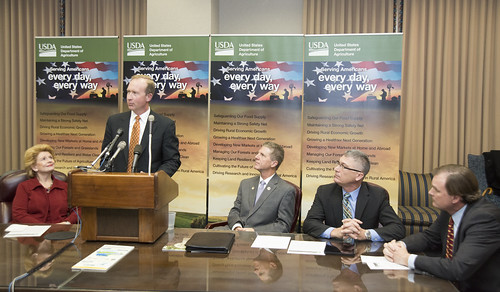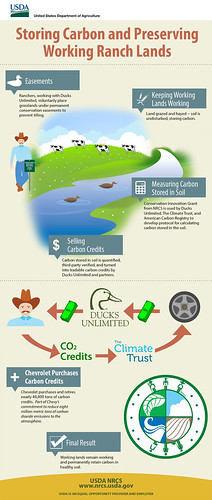
Earlier this week, USDA highlighted the creation of a market for carbon credits generated on working grasslands. Landowners benefit because they receive compensation for the carbon credits generated on their lands. They get a new source of revenue, while thriving grasslands provide nesting habitat for wildlife, are more resilient to extreme weather, and help mitigate the impact of climate change. Chevrolet, a division of General Motors, recently purchased almost 40,000 carbon dioxide reduction tons generated on working ranch grasslands in the Prairie Pothole region of North Dakota. It was the first purchase of its type.
Robert Bonnie, USDA's under secretary for Natural Resources and Environment, announced the purchase and USDA's involvement in the project at an event at USDA headquarters. He was joined by Senate Agriculture Committee Chair Debbie Stabenow of Michigan, Greg Martin, executive director for global public policy, General Motors; Sean Penrith, executive director of The Climate Trust and Paul Schmidt, chief conservation officer of Ducks Unlimited. The under secretary thanked Senator Stabenow, Chair of the Senate Agriculture Committee, for her staunch support for the program, which she said is delivering “real world measurable results.” Bonnie said he hopes this purchase will set a pattern for future carbon credit sales.
This is how the credit system works:
- Landowners voluntarily place lands under a perpetual easement but retain rights to work the land, such as raising livestock and growing hay.
- The carbon storage benefits of this avoided conversion of grasslands are quantified, verified, and formally registered resulting in carbon credits.
- The carbon credits are made available to entities interested in purchasing carbon offsets.
Chevrolet's purchase was undertaken voluntarily as part of its commitment to reduce eight million tons of carbon dioxide from being emitted. This is comparable to the annual carbon reduction benefit of a mature forest the size of Yellowstone National Park.
USDA's Natural Resources Conservation Service (NRCS) awarded $161,000 through a Conservation Innovation Grant (CIG) to Ducks Unlimited in 2011 to develop the necessary methodology to quantify the carbon stored in the soil by avoiding grassland conversions, resulting in the generation of carbon credits.
Besides the landowners, USDA, and Ducks Unlimited, other key partners that helped make this project a success include The Climate Trust, American Carbon Registry, The Nature Conservancy, Environmental Defense Fund and Terra Global Capital. Public-private partnerships to enhance U.S. carbon sinks such as forests, grasslands, wetlands and coastal areas, are a key part of the Obama Administration’s recently released Climate and Natural Resources Priority Agenda.

